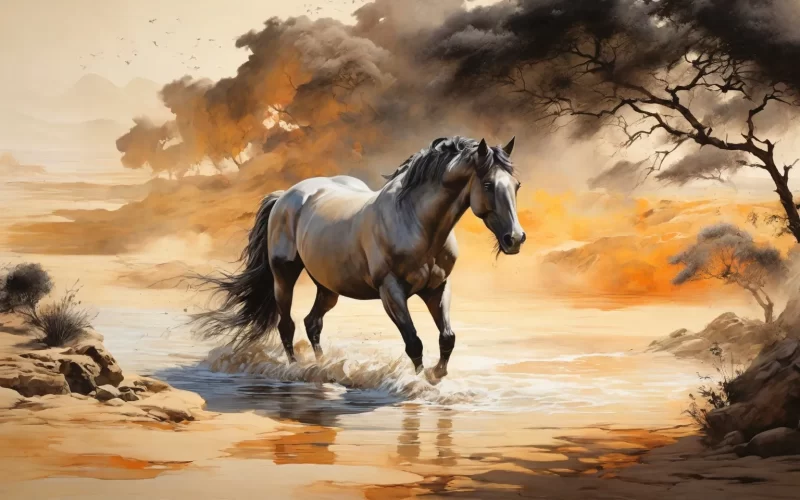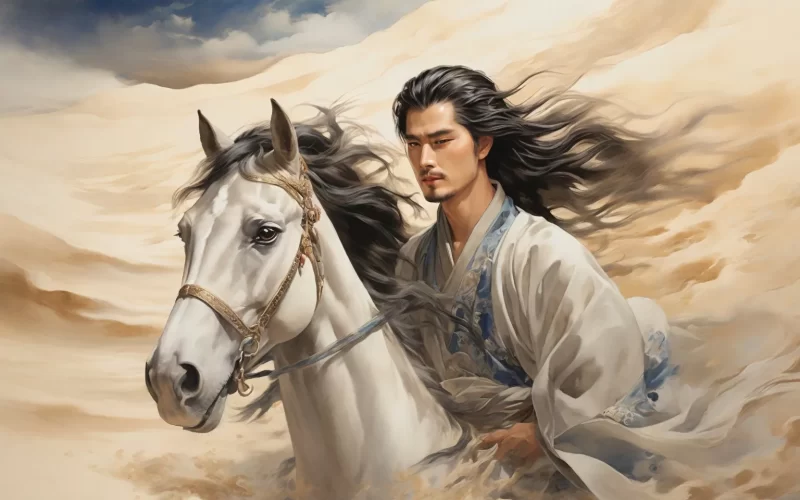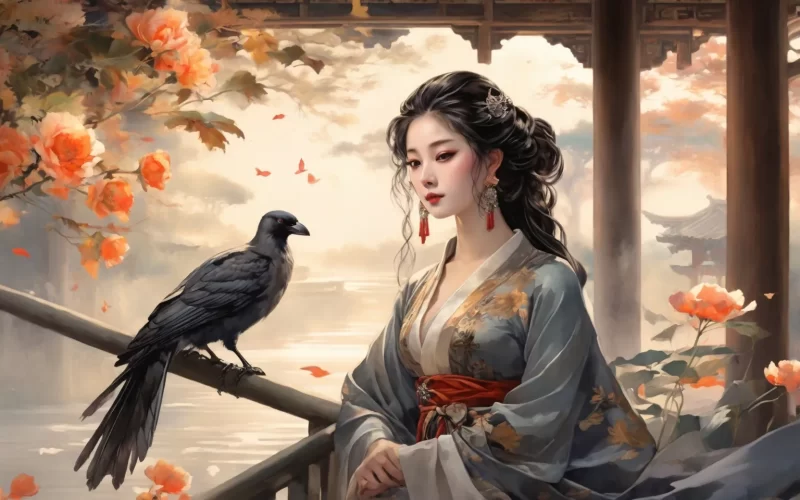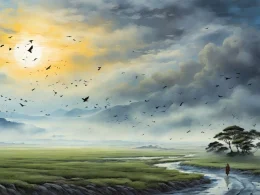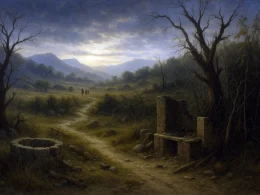Drink, my horse, while we cross the autumn water!-
The stream is cold and the wind like a sword,
As we watch against the sunset on the sandy plain,
Far, far away, shadowy Lingtao.
Old battles, waged by those long walls,
Once were proud on all men's tongues.
But antiquity now is a yellow dust,
Confusing in the grasses its ruins and white bones.
Original Poem
「塞下曲」
王昌龄
饮马渡秋水, 水寒风似刀。
平沙日未没, 黯黯见临洮。
昔日长城战, 咸言意气高。
黄尘足今古, 白骨乱蓬蒿。
Interpretation
This poem employs an old Yuefu title from the Tang Dynasty, addressing frontier themes while directly expressing the poet's skepticism and aversion towards war. Through a first-person narrative perspective, it depicts the harsh battlefield environment, soldiers' bitter suffering, and war's devastating costs with profound emotional resonance, standing as a masterpiece of Tang anti-war poetry.
First Couplet: "饮马渡秋水,水寒风似刀。"
Yìn mǎ dù qiū shuǐ, shuǐ hán fēng sì dāo.
"Watering horses to cross autumn's icy flow; / River chills, wind cuts like blades in blow."
The stark opening immerses readers in frontier hardship. Without rhetorical flourish, "icy water" and "wind like blades" (a common Tang metaphor seen in Cen Shen's works) viscerally convey both environmental cruelty and war's indiscriminate violence.
Second Couplet: "平沙日未没,黯黯见临洮。"
Píng shā rì wèi mò, àn àn jiàn lín táo.
"On flat sands sunset lingers before its fall; / Dimly appears Lintao's shadowed wall."
This marching scene's subdued dynamism reflects psychological weight. "Dimly" (黯黯) intensifies the gloom as daylight fades prematurely, while Lintao—a perennially contested frontier town—foreshadows historical trauma.
Third Couplet: "昔日长城战,咸言意气高。"
Xīrì chángchéng zhàn, xián yán yìqì gāo.
"Of ancient Great Wall battles they'd proclaim / How soaring morale fueled warriors' fame."
The ironic recollection contrasts past "heroic morale" with preceding bleakness, exposing wartime idealism's hollow core when faced with reality's brutality.
Fourth Couplet: "黄尘足今古,白骨乱蓬蒿。"
Huáng chén zú jīngǔ, báigǔ luàn pénghāo.
"Yellow dust shrouds ages past and new; / White bones strewn midst weeds come into view."
The devastating finale unveils war's timeless toll: "yellow dust" symbolizes endless conflict across eras, while "bones amidst weeds" materializes human costs with visceral horror—condensing temporal/spatial/ethical weight into ten characters.
Holistic Appreciation
The poem's unadorned language and authentic emotion unfold through layered perspectives: frontier landscapes, psychological states, and historical reflections. Initial descriptions of icy rivers and desolate vistas establish solitary unease; subsequent contrasts between past "heroism" and present "scattered bones" reveal war's destructive futility. Without explicit condemnation, the poet's anti-war stance emerges through devastating imagery and historical juxtaposition.
Artistic Merits
- Scene-emotion alchemy: Realistic and lyrical elements collide for maximum impact
- Restrained intensity: Understated details ("bones," "weeds") speak volumes
- Linguistic economy: Minimalist phrasing carries maximal emotional weight
- Historical resonance: Cyclical imagery ("dust across ages") universalizes anti-war message
Insights
The poem exposes war's fundamental tragedy: no "heroic spirit" can withstand time and death's erosion. Its first-person testimony forces readers to confront warfare's human toll, transcending its historical context to advocate for peace—a message retaining urgent relevance today as we weigh glory against its true costs.
Poem translator
Kiang Kanghu
About the poet

Wang Changling (王昌龄), circa A.D. 690 - 756, was a native of Xi'an, Shaanxi Province. Wang Changling's poems were mostly about the Border Places, love affairs and farewells, and he was well known during his lifetime. His seven poems are equal to those of Li Bai, and he is known as the “Master of seven lines”.





